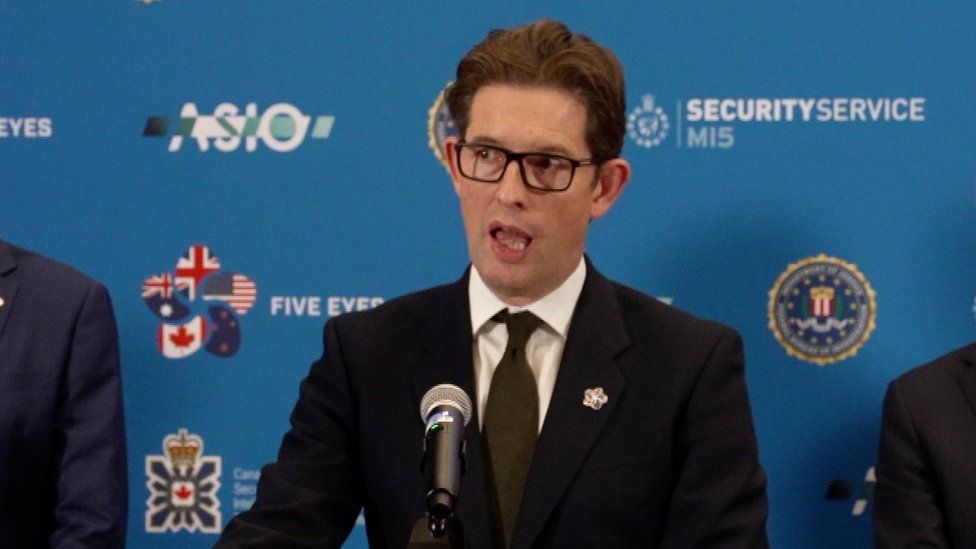
By Gordon Corera
Security correspondent, BBC News
More than 20,000 people in the UK have now been approached covertly online by Chinese spies, the head of MI5 said.
It comes amid a new warning to tens of thousands of British businesses of the risk of having their innovation stolen.
Ken McCallum was speaking to the BBC at an unprecedented public appearance of the security chiefs of the Five Eyes alliance in California.
The heads of US, UK, Australian, Canadian and New Zealand security agencies appeared together.
They did so for the first time to warn of commercials secrets being obtained by China.
Stanford University in California was chosen as the venue for the first public meeting because it lies in the heart of Silicon Valley. In both public statements and a closed session with entrepreneurs and investors, security chiefs warned that cutting-edge research is being stolen.
“We have seen a sustained campaign on a pretty epic scale,” Mr McCallum told the BBC in an interview during the event.
The heads of US, UK, Australian, Canadian and New Zealand security agencies come together
In the past, MI5 focused on protecting government secrets from foreign spies but now the fear is that innovation is often stolen from small companies, start-ups and researchers who may not previously have worried about security.
“If you’re working today at the cutting edge of technology then geopolitics is interested in you, even if you’re not interested in geopolitics,” Mr McCallum said.
MI5 is trying to warn tens of thousands of UK companies who are potentially at risk, and doing so requires the security service to go public in a way it has not done before.
Mr McCallum said that MI5 had now seen suspected Chinese agents approach over 20,000 people in the UK over professional networking sites like LinkedIn, in order to try to cultivate them to provide sensitive information, double the previously reported figure.
MI5 boss Ken McCallum
In the last year, MI5 has also seen more than 20 instances of Chinese companies considering or actively trying to gain access to sensitive technology developed by UK companies and universities through investments or other means where the full role of China is hidden, often through complicated company structures.
That has included at least two Chinese companies seeking to avoid the scrutiny required under law to access sensitive technology of UK companies undetected.
Another Chinese company is believed to have acquired stolen research data from a top UK university. And there are thought to be attempts to bypass and undermine the management and regulatory controls at another two top institutions in order to access and influence cutting-edge research.
MI5 and its allies also disrupted the acquisition of a sensitive UK tech company itself linked to UK military supply chains and the supply chains of other major western commercial companies. China has consistently denied accusations of espionage and wrong-doing.
The consequences of research being stolen in cutting-edge fields like Artificial Intelligence are not just for a company’s profitability but also for the future of western countries, the head of MI5 warned.
“These technologies are at a historic moment where they are beginning to change our world in some pretty fundamental ways,” Mr McCallum told the BBC.
“And we know that authoritarian states are laser-focused on the opportunities that these technologies may present for them.”
AI, in addition to the data collected by China, could even offer the chance to interfere with politics in a far more effective way, he warned.
Concerns over China were echoed by other members of the Five Eyes alliance.
“China has made economic espionage and stealing others’ work and ideas a central component of its national strategy and that espionage is at the expense of innovators in all five of our countries,” FBI Director Chris Wray told journalists.
“That threat has only gotten more dangerous and more insidious in recent years.”
He said there were more than 2,000 current FBI investigations linked to China and that at one point his organisation was opening a new investigation every 12 hours.
Image source, FBI
The security chiefs appeared together for the first time to warn of technological innovation being stolen by China.
“All nations spy,” Mike Burgess – the head of Australia’s security service – said at the public event featuring the five spy chiefs, “but the behaviour we are talking about here goes well beyond traditional espionage.” He argued the scale was unprecedented in human history and needed to be called out.
Decoupling western economies from China would be unrealistic and damaging, the security chiefs argued, and so instead the priority is to identify and protect sensitive areas. Their appearance was timed with the launch of new guidance to reach those who would previously not have had contact with security services.
The meeting took place in the shadow of events in the Middle East and concerns of increased radicalisation and threats domestically.
“We can focus on more than one thing at one time,” the FBI Director said, describing the threat from China as “existential”.








